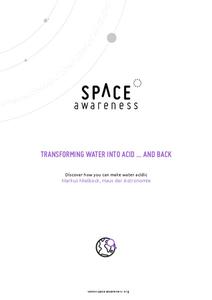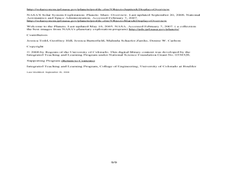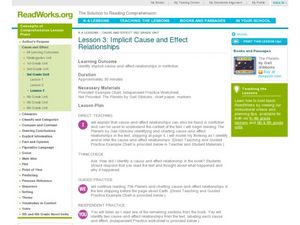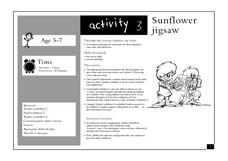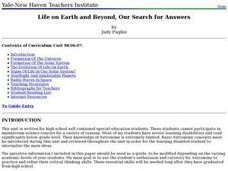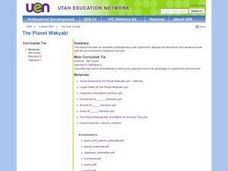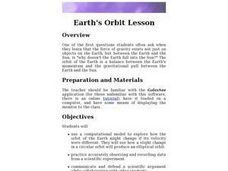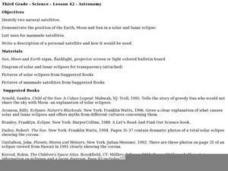Space Awareness
What is Time?
Does it ever seem like time is slipping through your fingers? Model the passing of time with an hourglass activity in which individuals determine whether hourglasses are the most efficient way to measure time.
Space Awareness
Transforming Water Into Acid ... And Back
Greenhouse gases affect marine wildlife in life-threatening ways. Through experimentation, your classes explore the acidification of water from the main greenhouse gas carbon dioxide. As they introduce carbon dioxide to water, a pH...
Space Awareness
The Climate in Numbers and Graphs
Weather versus climate: weather relates to short time periods while climate averages the weather of a period of many years. Scholars learn about average temperature and precipitation in various climate zones and then apply statistics...
Space Awareness
Valleys Deep and Mountains High
Sometimes the best view is from the farthest distance. Satellite imaging makes it possible to create altitude maps from far above the earth. A three-part activity has your young scientists play the role of the satellite and then use...
Space Awareness
Oceans on the Rise
Temperature rises and land disappears! Through a lab exploration, learners understand the effect of temperature increase on water similar to the effect of global warming on our oceans. As they heat the water in a flask, they measure the...
Space Awareness
Water is a Heat Sink
One of the key objectives of Europe's Copernicus Earth program is to monitor the temperatures of the oceans and seas on Earth. Young scholars learn the effects of different heat capacities through two experiments. These experiments...
Roald Dahl
Matilda - The Weekly Test
Readers take the main characters in Matilda and individually describe them through a mnemonic. To get there, group members create an acrostic poem describing the character they were given, and choose one of the words from the acrostic...
Curated OER
Mars and Jupiter
Students learn about how engineers help us to know about Mars and Jupiter. In this Mars and Jupiter lesson plan, students are introduced to the telescope, deep space antennas, spacecraft, and planetary rovers that engineers designed to...
Curated OER
Implicit Cause and Effect Relationships
Cause and effect relationships can be found in both fiction and non-fiction texts. As they read the book, The Planets by Gail Gibbons, learners keep an eye out for cause and effect relationships. They chart all of the causes and effects...
Curated OER
Extreme Elevations
In this geography worksheet, 5th graders work in groups in order to locate and graph mountains found on all the continents of planet earth.
Curated OER
Motion Through the Ages
Eighth graders conduct internet research to produce a timeline of man's growth in understanding of concepts of motion and planetary motion through history.
Curated OER
Earth From Space
Students watch a series of programs from NASA titled "Earth From Space". After viewing the program, they identify ways NASA is researching the reasons why the Earth is changing. They discuss the various levels of the atmosphere and...
Curated OER
Terrabagga Activity using a Magnetometer
Students use a magnetometer to determine the orientation of a magnetic field. In this magnetism lesson, students build a simulated planet and use a simple magnetometer to determine the orientation of their planet's magnetic field.
Curated OER
Sunflower Jigsaw
Students recognize and name the main parts of a flower. In this life science lesson, the teacher leads a discussion about the parts of a plant, then students color and cut out the parts of a planet, then glue the parts together...
Curated OER
Life on Earth and Beyond, Our Search for Answers
Students in a special education classroom are introduced to how the universe and solar system was formed. Using the internet, they research the characteristics of Earth that support human life. In groups, they compare and contrast...
Curated OER
Models of the Earth and Moon
Students explore the earth's rotation and phases of the moon. In this planets instructional activity, students rotate and revolve around a light representing the sun. Students use movement and props to simulate what causes the phases of...
Curated OER
What We Can Do!
Students examine how citizens protect natural resources. In this citizens and natural resources lesson, students listen to a reading of Our Planet: Earth. They discuss what natural resources are and why they need to be protected. They...
Curated OER
Disposing Garbage
Young scholars explore environmental cleanliness by completing a worksheet in class. For this waste management lesson, students identify the technological advances in society and how they increase waste production our planet is unable to...
Curated OER
Planet X
Students work together to create their own bill of rights. They pretend they are the founder of a new colony and need rules. They must negotiate with one another as well.
Curated OER
The Planet Wakyabi
Fifth graders explain how organisms' specialized structures and variations work with the environment to help them survive.
Curated OER
Planet/Constellation Mobile
Pupils, through small group discussion, identify and share a rationale for shapes and patterns in the construction of a mobile that represents the solar system that makes them think of the creation of our solar system.
Curated OER
Life on a Fiery Planet
Learners study the effects on the evolution of human culture from volcanic events worldwide.
Curated OER
Earth's Orbit Lesson
Tenth graders devise a computational model to explore how the orbit of the Earth might change if its velocity were different. Using accurately recorded data, 10th graders defend a scientific argument.
Curated OER
Science - Lesson 42 - Astronomy
Third graders demonstrate the position of the Earth, Moon, and Sun in a solar and lunar eclipse. They list uses for manmade satellites and write a description of how a satellite would be use.
Other popular searches
- Lesson Planet Lo Gin
- My Lesson Planet
- Planet Lesson Plans
- Google Planet Lesson Plans
- Lesson Planet Membership Fee
- Lesson planet.com
- Cost of Lesson Planet
- Lesson Planet Cost
- Creative Lesson Planet Earth
- Planets Lesson Plans
- Lesson Planet Home Page
- Lesson Planets Phone Number



